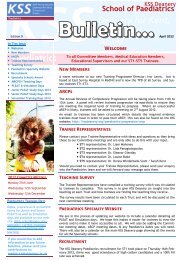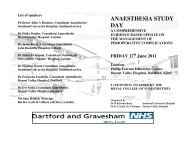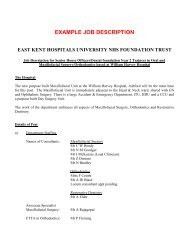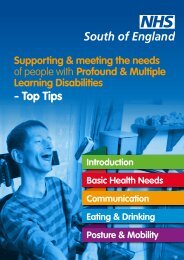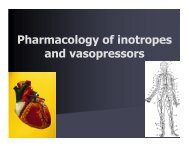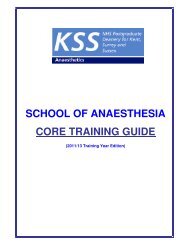KSS Deanery
KSS Deanery
KSS Deanery
Create successful ePaper yourself
Turn your PDF publications into a flip-book with our unique Google optimized e-Paper software.
<strong>KSS</strong> <strong>Deanery</strong>School of AnaesthesiaSpecialty RegistrarTrainee HandbookTrainee Name____________________________________________________________________________2011 Edition(If this handbook is found please return to the Anaesthetics Department)
<strong>KSS</strong> Specialty Registrar (StR) Trainee HandbookWe are delighted to welcome you to the <strong>KSS</strong> Intermediate & Higher Specialty TrainingCommittee, established in August 2009, dedicated to providing the highest quality oftraining and clinical experience across a wide range of acute Trusts.The Trusts participating in the training programme include:o Brighton and Sussex University Hospitals NHS Trusto Western Sussex Hospitals NHS Trusto East Sussex Hospitals NHS Trusto Queen Victoria Hospital NHS Foundation Trusto East Kent Hospitals University NHS Foundation Trusto Dartford and Gravesham NHS Trusto Royal Surrey County Hospital NHS Trusto Surrey and Sussex Healthcare NHS Trustand some time during the final two years of the programme is spent at St. George’s Schoolof Anaesthesia and South East School of Anaesthesia.The training programme is modular and competency based and will be adapted to therequirements of the curriculum. The programmes are those defined by the Royal College ofAnaesthetists, the requirements of which may be found at: www.rcoa.ac.ukThe posts are recruited nationally to <strong>KSS</strong> <strong>Deanery</strong> at ST3 level and we offer ‘Run throughGrade’ (RTG) training to ST7. A National Training Number is issued by the Postgraduate Deanon appointment to our <strong>Deanery</strong>.Training rotations are organised by the training programme director and are fixed at ST3-5and then flexible according to the individual needs of the trainees at ST6-7.We hope that you have a productive and enjoyable time in your training programme with the<strong>KSS</strong> <strong>Deanery</strong> School of Anaesthesia (SOAN).SOAN Committee, July 20113
<strong>KSS</strong> <strong>Deanery</strong> Trust Sites4
ContentsSOAN StR Personnel Page 6SOAN StR Contact Numbers Page 6SOAN StR School Address Page 6College Tutor Contacts Page 7Medical Staffing & Education Manager Contacts Page 8-9SOAN StR Trainee Information Page 9RCOA e-Portfolio Page 10ARCP within <strong>KSS</strong> Page 11Guide To Recommended HST ARCP Outcomes Page 12Intermediate Level Curriculum Page 13Training Assessments Requirements Page 14Training Day Programme Page 14RCOA Examination Information Page 15Policies and Documents Page 16 - 251. The Gold Guide2. Out of Programme Policy and overview3. Trainee Support and Trainee Representative Information4. Study Leave and Relocation Guidance5. Maternity Leave6. Blood Borne Virus7. Careers Support at the <strong>Deanery</strong>8. Library services9. Local Faculty Groups, Local Academic Boards and Local Educational Provider visitsResources & Support Network Page 26-27Annex A: GMC List of domains and standards Page 28-295
SOAN StR Personnel<strong>KSS</strong> <strong>Deanery</strong> School of Anaesthesia Personnel• Chris Carey Head of School - ccarey@kssdeanery.ac.uk• Justin Dickens – Higher Specialty Training Programme Director: justin.dickens@wsht.nhs.uk• Stellios Panayiotou - Regional Advisor: Stellios.Panayiotou@wsht.nhs.uk• Educational supervisor (please request this information from the Trust anaestheticsdepartment)• Jim Cooper - <strong>KSS</strong> Anaesthetic Simulation Lead: jim.cooper@bsuh.nhs.uk• College Tutor (ask in your anaesthetics department or refer to the contacts list on page 6)• Medical Workforce Teamo Denise Chukwu (Medical Workforce Projects Officer for the School of Anaesthesia) -dchukwu@kssdeanery.ac.uko Paul Kociucki - (Medical Workforce Projects Assistant for School of Emergency Medicine,O&G and ACCS Committees, School of Anaesthetics and Intensive Care Medicine STC) -pKociucki@kssdeanery.ac.uko Jonathan Dunne (Medical Workforce Administrator for the School of Anaesthesia & ICMSTC) anaesthetics@kssdeanery.ac.uk• Training Representative(s) are:o Abhijoy Chakladar – abhijoy.chakladar@gmail.como David Helm – davidhelm@doctors.org.uko <strong>KSS</strong> <strong>Deanery</strong> Careers Departmentowww.kssdeanery.org/education or www.medicalcareers.nhs.ukSouth East School of Anaesthesia Personnel• Claire Shannon – Deputy Head & Regional Advisor: claire.shannon@gstt.nhs.uk• Charl Jooste - Higher Specialty Training Programme Director: charl.jooste@nhs.netSt. George’s School of Anaesthesia Personnel• Paul Quinton – Head of School: paul.quinton@stgeorges.nhs.uk• Jo Norman - Higher Specialty Training Programme Director:joanne.norman@stgeorges.nhs.ukSOAN HST Contact NumbersTelephone: 020 7415 3406/3433 or 020 7415 3670, Fax: 0207 415 3686SOAN HST School Address:<strong>KSS</strong> <strong>Deanery</strong> - School of Anaesthesia (SOAN)5th Floor, Alpha House100 Borough High StreetLondon, SE1 1LB6
SOAN StR College Tutor ContactsCollegeTutorDr. Name:SandeepSudanSarahHardyRob HillEmail: Telephone: Based at:sandeep.sudan@bsuh.nhs.ukhardyfindley@gmail.comRob.Hill@wsht.nhs.uk01444 441881x 823701273 696955x 430701243 788122x 5290Brighton &Sussex, RoyalSussex CountyBrighton &Sussex, PrincessRoyalSt Richard’s,ChichesterGez GouldGerard.Gould@esht.nhs.uk01424 755470x 8340Conquest,HastingsChetanPatelHowardWakelingSimonWaltonchetan.patel@qvh.nhs.ukHoward.Wakeling@wsht.nhs.uksimon.walton@esht.nhs.uk01342 410210 Queen Victoria,x 256 East Grinstead01903 285151 Worthing GeneralHospital01323 417400 East Sussex,x 3745 EastbourneMadelaineCoupeMadelaine.Coupe@ekht.nhs.uk01227 766877x 74669East Kent, Kent &CanterburyMarkanduSathialingamSylvaDolenskaVyakarnamPrasadClaireMearnsVisweswarNatarajSathi2611@yahoo.comSylva.Dolenska@ekht.nhs.ukVyakarnam.prasad@dvh.nhs.ukClaire.Mearns@sash.nhs.ukdrnataraj@yahoo.co.7uk01843 225544 East Kent, QEQM01227 766877x 74669East Kent,William HarveyHospital01322 428648 Dartford &Gravesham,Darent Valley01737 768511/07946369932Surrey & SussexHealthcare - EastSurreyRoyal SurreyCounty
SOAN StR MSM & MEM ContactsMedicalStaffing &EducationalContactNamesJane Burrage/Natalie KennNora TesterJanet Botting/ Tina ScottSue Plummer/ Eve SavageMelanie Clay/ BebbaSmithersLinzi Garman/ Jan McCleanJane Mills /June TomsKim Fishlock/ RagsSubramaniamCaren Jones /Phillipa Lee &Linda SmithClaire NottageNisha Patel /LesleyWoodmanSandra Chase/ LouiseDuffieldTrust /SchoolBrighton &SussexUniversityNHSHospitalsTrust(BSUH)East SussexHospitalsNHS TrustQueenVictoriaHospital NHSFoundationTrustWesternSussexHospitalsNHS TrustWesternSussexHospitalsNHS TrustEast KentUniversityHospitalsNHSFoundationTrustDartford &GraveshamSurrey &SussexHealthcareRoyal SurreyCountyHospitalRoyal SussexCounty /Princess RoyalConquest &EastbourneDistrictGeneralQueen VictoriaSt Richard'sWorthingKent &CanterburyQEQMWilliam HarveyHospitalDarent ValleyEast SurreyRoyal SurreyCountyPostal AddressEastern Road, BrightonSussex, BN2 5BE /Lewes Road HaywardsHeath, RH16 4EXThe Ridge, St Leonard’sOn Sea, East Sussex,TN37 7RDHoltye Road,East Grinstead, W.Sussex, RH19 3DZSt Richard's HospitalSpitalfield Lane,ChichesterWest Sussex, PO19 6SEWorthing HospitalLyndhurst Road, WorthingWest Sussex, BN11 2DHEthelbert Road,Canterbury, KentCT1 3NGSt Peters Road, MargateKent, CT9 4ANKennington Road,Willesborough, AshfordKent, TN24 0LZPhilip Farrant EducationCentre, Darenth WoodRoad, Dartford, Kent,DA2 8DA.Canada Avenue REDHILLSurrey RH1 5RHEgerton RoadGuildfordGU2 7XXEmail Address /Website AddressJane.Burrage@bsuh.nhs.uk;NatalieKenn@bsuh.nhs.uk;Nora.Tester@bsuh.nhs.ukJanet.Botting@esht.nhs.ukMedicalStaffing@esht.nhs.uksue.plummer@qvh.nhs.ukeve.savage@qvh.nhs.ukinfo@qvh.nhs.ukmelanie.clay@rwstr.nhs.ukbebba.smithers@rws-tr.nhs.ukLinzi.Garman@wsht.nhs.ukjan.mcclean@wsht.nhs.ukjayne.mills@ekht.nhs.ukjune.toms@ekht.nhs.ukkim.fishlock@ekht.nhs.ukrags.subramaniam@ekht.nhs.ukcaren.jones@ekht.nhs.ukphillipa.lee@ekht.nhs.uklinda.smith@ekht.nhs.ukClaireNottage@dvh.nhs.uknisha.patel@sash.nhs.uklesley.woodman@sash.nhs.ukschase@royalsurrey.nhs.uklduffield@royalsurrey.nhs.ukTel. No01273 696955(RSCH)01444 441881(PRH)01323 41385501342 41021001243 831 62701903 28512601903 28512201227 766877 ex7466701843 225544 ex62646012278 68687 &01233 61611701233 61606301322 42810001737 768511ext 6198 &01737 231 72201483 571122 ex43798
Ivy HaganAnne Ramlal(STUDYLEAVECONTACT)St. George’sSchool ofAnaesthesiaSouth EastSchool ofAnaesthesiaSt George’sBased at Guy’sHospitalBlackshaw RoadTooting, LondonSW17 0QTSESA School OfficeDepartment ofAnaesthesia, Guy'sHospital, London, SE19RTIvy.Hagan@stgeorges.nhs.ukhttp://www.stgeorgesanaesthesia.com/anne.ramlal@gstt.nhs.uk;http://www.southeastschool.co.uk/020 8725 001802071880648SOAN StR Trainee InformationTrainees appointed to the RCOA CCT programme must do the following: (all forms &documents are available from http://www.rcoa.ac.uk/ )• Complete the RCOA Programme registration form & send it to RCOA – if you do not dothis it will significantly delay your award of CCThttp://www.rcoa.ac.uk/docs/Registration_HSTraining.pdf• Familiarise yourself with the RCOA 2010 curriculumhttp://www.rcoa.ac.uk/docs/CCTinAnaesth1.2-1Aug2010.pdf• You must maintain an up to date training portfolio which will be reviewedregularly.• You must complete an Anaesthetics Logbook and insert the summary on your e-Portfolio. This can be downloaded from the following website:http://www.logbook.org.uk• You complete an Audit at ST3/4 and annually at ST5-7 which will be required at yourAnnual Review of Competence Progression (ARCP)• That you have a record of successful completion of FRCA Primary exams andcomplete your FRCA Final exams prior to your ST4 ARCP. It is strongly advised for youto get on with this as soon as you are appointed to our ST3 post• Ensure that the RCOA assessments of competence for any basic, intermediate &advanced Anaesthetic training and complementary specialty training are completedand are kept in your e-Portfolio• Inform the Programme Director of any dual specialty that you have been appointedto; for instance an ICM programme and confirm what effect this will have on your CCTdate• Download & start using the IBTICM logbook (under 'assessments' on www.ibticm.org)• Remember to use your e-Portfolio to demonstrate areas of excellence - qualityevidence and quality documentation is important.• The annual GMC trainee survey is mandatory and you will need to provide evidencethat you have completed this and place a copy on your e-Portfolio9
RCOA Training e-PortfoliooThe Royal College of Anaesthetists has developed an electronic portfolio (e-portfolio) whichwill be available to all trainees from August 2011. Your current name and email address hasbeen sent to the RCOA when you accepted a post at <strong>KSS</strong> <strong>Deanery</strong> and when you register as amember of the RCOA you should receive your College Reference Number (CRN) and e-portfolio username and password. Please check the RCOA website for detailed informationabout the RCOA e-Portfolio - http://www.rcoa.ac.uk/index.asp?PageID=1711o A RCOA Training e-Portfolio Guide has been developed by the RCOA to facilitate the new e-Portfolio. Please find enclosed in your pack the February edition of this guide while the Pilote-Portfolio is in place and being tested by Bristol, Scotland South East and Northern Ireland<strong>Deanery</strong>. An updated guide will be available before the RCOA e-Portfolio goes ‘Live’ in Augustso please look out for this and update your copy when it is available.oIf you require any further information please get in touch with the RCOA e-PortfolioAdministrator – Andrew Leabourne e-Portfolio@rcoa.ac.ukoIf there are missing Educational Supervisors or Assessors which should be appearing in lists foryou to access – please could you email their details: first name, surname & email address tothe e-Portfolio Support Team at: e-Portfolio@rcoa.ac.uk for the Team to check their details.You will be contacted to confirm if the individual exists on the system.oWithin your Intermediate Training Appendices issued by the School on our website and a CDcopy you will be provided with the various Anaesthetics and ICM assessment forms, appraisaldocuments (which may need to use; to be completed with your Educational Supervisor) andreminders to help you through your clinical & educational training and help you prepare foryour Annual Review. It would be very helpful to us at the <strong>Deanery</strong> & School if you use the e-portfolio to place a copy of all the documents required for your Annual Review ofCompetence Progression (ARCP).oThe Faculty of Intensive Care Medicine (FICM) has not developed an e-portfolio so you willstill need to use a paper based method to form a Training Record for the Intensive CareMedicine (ICM) module of your training. The FICM provides an electronic logbook which can befound at: http://www.ficm.ac.uk/ and further FICM documents can be found on our websiteor your individual CD copy.10
ARCP within <strong>KSS</strong>Annually you will be called to attend an ARCP. At this ARCP you will be required to presentthe RCOA assessments of competence for Basic & Intermediate Anaesthetic training and anycomplementary modules. You will also need to present your Educational SupervisorsStructured report. If any of this documentation is incomplete you may not be able to startyour next level of anaesthetic training.StR ARCP dates are already set on the following days:Friday, 6 July and Friday, 13 th July 2012Please be aware of the dates when you are arranging your annual leave.Your RCOA e-Portfolio will need to have the following documents to present to theReview Panel at your ARCP:FORM R - completed and signed with any amendmentsEducational Supervisor's Structured Report, signed by your EducationalSupervisor or College Tutor confirming that you have met all yourcompetenciesA current curriculum vitae (dated)Confirmation of (continued) Registration as a Medical Practitioner with theGMC (Certificate, License or Registration Number)Proof of College Registration/Letter from the RCOAYour work based assessment record, with DOPs, CBDs & Anaes-CEXs (onlyrequired if attending face to face)A summary of your log books for RCOA & ICM. This must includesummaries(but no patient details or raw data) for each module completedEvidence of passing Final FRCA (if applicable)A summary sheet listing course/meetings attended during the yearA summary of any publications, audit/research projects undertakenList of Sick, Parental, Carers or Maternity Leave taken over the yearLetter of thanks/commendation/complaints/grievancesEvidence of Completion of Trainee GMC SurveyObstetric Module Signoff or other relevant Modules (for ST4's only)Intermediate Level Training Certificate (ILTC) if required for ST4's can becompleted at your ARCP11
Guide To Recommended ARCP OutcomesOutcome 1Achieving progress and competences at the expected rateOutcome 2Development of specific competences required – additional trainingtime not requiredOutcome 3Inadequate progress by the trainee – additional training timerequiredOutcome 4Released from training programme with or without specifiedcompetencesOutcome 5Incomplete evidence presented –additional training time may be requiredOutcome 6Gained all required competencesOutcome 7.1Satisfactory progress in or completion of the LAT / FTSTA placement.Outcome 7.2Development of Specific Competences Required – additional trainingtime not required LAT / FTSTA placementOutcome 7.3Outcome 7.4Inadequate progress by the trainee – additional training timerequired LAT / FTSTA placementIncomplete Evidence Presented - LAT / FTSTA placementOutcome 8Out of programme; OOPE/OOPR/OOPCNote: OOPT must have an annual review and would therefore bereviewed under Outcomes 1-5; not Outcome 8Outcome 9Top-up training12
Intermediate Level CurriculumGeneral Units of Training (these will be undertaken during a DGHattachment): Day Surgery ENT General Surgery / Gynaecology / Urology Orthopaedic & Trauma Surgery Regional AnaesthesiaThese units will usually be completed during the ST3 year.Key Units of Training Cardiothoracic Anaesthesia ITU Neuroanaesthesia Obstetric Anaesthesia Paediatric Anaesthesia Pain Management (acute & chronic) – logbookhttp://www.rcoa.ac.uk/docs/FPM%20Logbook%20V1.0.xlsCardiothoracic, Paediatric and Neuroanaesthesia and ITU will usuallybe completed in 3/12 modules in BSUH, usually at ST4. Obstetricanaesthesia and pain will be completed during DGH attachment,usually in ST3.It is vital that the correct training units are completed by the end ofST3 and ST4 in order for the Intermediate Level Training Certificateto be awarded.13
Training Assessment RequirementsAnaesthetic: Assessment Tools KeyCodeACDEILMSWorkplace Based Assessment ToolsAnaesthesia Clinical Evaluation Exercise [A-CEX]Case Based Discussion [CBD]Direst Observation of Procedural Skills [DOPS]ExaminationIntensive Care Medicine Clinical Evaluation Exercise [I-CEX]Anaesthesia List Management Assessment Tool [ALMAT]Multi-source Feedback [MSF]SimulationAs per RCOA guidance the minimum number of workplace basedassessments (WBAs) to be completed by trainees at each stage oftraining is as follows:DOPSCEXCBD3 every 3 months, 12 per year2 every 3 months, 8 per year1 every 3 months, 4 per yearFor the general units of training listed above, one of each of these isrequired for every unit.Assessments for ST3/4 are all listed in a separate document providedby the School – ‘Intermediate Level WBAs’. Please refer to this forall modules and check them off as they are completed.14
Training Day ProgrammePlease check <strong>KSS</strong> SOAN Website regularly for up to date details:http://kssdeanery.org/specialty/currenttrainees/anaesthetics/teaching-and-learning/higher-training-daysThe Royal College Of Anaesthetists (RCOA) ExaminationInformationFRCA Final to be completed before the end of ST4 year.Please check RCOA for FRCA Final SyllabusFinal FRCAThe Final FRCA examination is taken in two sections on separate days: The Multiple Choice Question (MCQ) and Short Answer Question (SAQ)papers, and Two Structured Oral Examinations (SOE).For further information email: exams@rcoa.ac.uk »Next Final FRCA Examinations: DatesNext Final FRCAMCQs/SAQs6th September 2011 13th March 2012Next Final FRCA Vivas 5th December 2011 25th June 2012Other exam details can be found from the Royal College of Anaesthetistswebsite which provides exam guidance and application forms.15
Policies and documents1. The Gold Guide• The 2010 Gold Guide replaces all previous versions -http://kssdeanery.org/gold-guide• Relevant for the length of your training• Provides over arching guidance and standards as to the arrangementsfor Specialty Training in the UK• Refer to the Gold Guide together with <strong>Deanery</strong> guidance for standardsrelating to:• The role of statutory bodies• Supervision• LAT and LAS• Less Than Full Time Training, Maternity Leave, OOP• Deferral• Appraisal, assessment and annual planning16
2. Out of Programme Policy and overviewThis guidance covers all Specialty Registrars in the <strong>KSS</strong> <strong>Deanery</strong> with theexception of GP, and offers direction for all Specialty Schools and Trainees.This document indicates the <strong>KSS</strong> <strong>Deanery</strong> preferred methodology forimplementing the Gold Guide Out of Programme (OOP) guidance. The full GoldGuide can be found online at www.kssdeanery.org/home/currenttrainees/arcp/gold-guideA Core Trainee or Specialty Training Registrar may take time out of theirprogramme to undertake a period of research, gain clinical experience or otherappropriate categories that is or is not available within <strong>KSS</strong>. Out of Programmeplacements are designed to accommodate this and can take place either in theUK or abroad.All OOP requests need to be agreed by the Postgraduate Dean, so trainees areadvised to discuss their proposals as early as possible. It is normally expectedthat a trainee would have completed one year of training before submitting anapplication given the short period and nature of the training.Types of OOPThere are four types of OOP which may be considered, the details of which areexplained later in this document:• OOPT – Out of Programme for Approved Clinical TrainingThis is where a trainee is undertaking GMC prospectively approvedclinical training which is not part of the trainee’s specialty trainingprogramme.• OOPE – Out of Programme for Clinical ExperienceWhere a trainee is gaining clinical experience which is not approved byGMC but which may benefit the doctor or help support the health needsof other countries.• OOPR – Out of Programme for ResearchWhere a trainee is undertaking a period of research.• OOPC – Out of Programme for Career BreakWhere a trainee is taking a planned career break from the specialtytraining programme.NoticeTrainees should give their Postgraduate Dean as well as current and nextemployers a minimum of six month’s notice, but preferably as much aspossible. This is to ensure that service issues and the needs of patients can beproperly addressed. In exceptional circumstances notice of three months maybe acceptable.17
3. Trainee Support and Trainee Representative Information<strong>KSS</strong> <strong>Deanery</strong> is committed to supporting Trainees who are in difficulty or at riskof being in difficulty through the Trainee Support Group ForumGuidance available online:www.kssdeanery.org/home/current-trainees/support-services/supportingtrainee-difficultyTrainees must be fully aware and involved at all stages. If you have concernsabout your own progress get in touch early, don’t wait! Talk to:• Educational Supervisor (in the first instance), or• Clinical Tutor• <strong>Deanery</strong> school administration teamWith help from your Educational Supervisor, develop a plan.If your ability to progress is at risk, your Head of School and the Trainee inDifficulty Committee will be kept informed of your progress. They are able tooffer additional support if required.The aim is to get you ‘back on track’ and for training to continue successfully.Trainee Support CategoriesCategories include:• Inadequate performance• Inadequate/Mismatch of training post• Health issues• Employment Issues• Examination failuresA. Local Mechanism for Problem Solvingo Discussion between AES (or PD) of Local Faculty and the Trainee.Ideally MEM/Trainee advocate present.o Written report (Trainee Action Plan) signed by Trainee, with ActionPlan. Trainee keeps a copy.o Satisfactory resolution – recorded in LFG minutes.o Not resolved – referral to <strong>KSS</strong> School of Surgery (or via SOS to STC forHST) with Trainee’s knowledge.B. School of Anaesthesia Mechanism for Problem Solvingo Head of School (HoS)/Training Program Director (TPD) assigned.o Meeting with Trainee – documented on Trainee Action Plan withTrainee agreeing to the Action Plan with the assigned HoS/TPD18
o Action Plan reviewed at Trainee Support Group (TSG) Forum.o Trainee, TSG Forum, via HOS or delegate, informed of progressmonthly until resolution/closed.o Feedback the Action plan to Local Faculty Group PD and AES.Trainee Representative Information• Elected or chosen by you or your peers• Work with either the LFG/LAB or a Specialty School• Ensure views, opinions, concerns and experiences of trainee doctors aretaken into account at every level of decision-making• May also work with Medical Education Managers, Academic Registrar,Doctors’ Liaison Officer or Trust Education AdvisorResponsibilities• Attends the open section of the STC meeting.• Represents the views and interests of the trainees.• Provides feedback to the trainees on developments in the RITA & ARCPprocesses.• Canvasses colleagues for opinions .• Disseminate good aspects of training.• Attends training committees• May attend Local Faculty Group Meetings at TrustSkills• Time management• Presentation and communication• Networking• Self confidence and assertiveness• Leadership and diplomacy• Organisational and administrative• Initiative, motivation, responsibility• Commitment to activity outside your programme of study• Potential managerial skillsPlease note:If you are interested in becoming a Trainee Representative please let theCollege Tutor at your Hospital and the School know(anaesthetics@kssdeanery.ac.uk).19
4. Study Leave and Relocation GuidanceStudy LeavePlease find below some information on your study leave guidance:• Entitled to up to a maximum of 30 days in a year (which is calculated from the dateof commencement of appointment or rotation)• Leave to sit necessary examinations is allowable but does not count against theentitlement of study leave• Trainees in locum specialty posts, those in FTSTAs and LATs exceeding three monthsare entitled to study leave pro rata• There is no entitlement to study leave for LAS appointmentsUsing your study leave:• Approval rests with your Local Clinical Tutor• Applications should be received by your Clinical Tutor on the appropriate form atleast 6 weeks prior to the leave• Leave should not be taken within the first two weeks of a new appointment• You must have an agreed personal development plan before applying for Study LeaveSTUDY LEAVE AMOUNTInitial Study Leave Budget: £860Less Administration Charge Top Slice £110Total StR Study Leave Budget: £750• Study Leave is used by your specialty school to deliver centrally run training days thatyou are required to attend.• South East School of Anaesthesia is responsible for the reimbursement of your StudyLeave Budget Claim. If you require any further information please Email:anne.ramlal@gstt.nhs.ukYou will require the following:1. Completed Study Leave Budget Claim Form2. Signature from your College Tutor to confirm that the course meets the criteria forStudy Leave funding.3. Original Receipts (Certificates and copies are not acceptable);4. Your Bank Details (Name, Account Number and Sort Code).Your reimbursement cannot be processed if you have not sent the above requirement tothe:Anne RamlalSESA Administrator Postgraduate Centre,Gassiot House, St Thomas’ HospitalWestminster Bridge RoadLondonSE1 7EH20
RelocationLondon <strong>Deanery</strong> is responsible for allocating the reimbursement of relocation expenses andassociated expenses, such as excess travel costs, for all junior doctors on a recognised <strong>KSS</strong>or London training programme in Primary and Secondary Care (expect <strong>KSS</strong> GP Registrars inGeneral Practice Posts), whilst they are employed by a London or <strong>KSS</strong> Trust.First StepFill and return the 'Relocation Eligibility Form'Refer to the ‘How to Claim' relocation expenses page for further guidance on how to claimreimbursement of your relocation expenses.Please note that some relocation expenses are subject to tax and national insurance. This isdefinitely the case when claiming excess travel and continuing commitments expenses. TheLondon <strong>Deanery</strong> will clarify whether your expenses are taxable in your eligibility letter.Second StepOnce you have completed the eligibility process please refer to the ‘Approved ExpenditureClaim Forms’ page for the necessary forms.If you have any questions or queries please contact the Relocation Department atrelocation@londondeanery.ac.ukThe Relocation Team consists of Tracie Russell, David Pardue and Carol Wells.All forms should be posted to:Relocation DepartmentLondon <strong>Deanery</strong>Stewart House32 Russell SquareLondonWC1B 5DNPlease note that the Relocation Department does NOT reimburse travel related to:o on call commitmentso clinical travelo interview related travelIf you want to claim travel related to on call commitments or clinical travel please contactyour medical staffing officer at your employing trust.For further information: http://www.londondeanery.ac.uk/var/relocation21
5. Maternity LeaveEach Trust will have a Maternity Policy which must be referred to and read inconjunction with the <strong>KSS</strong> <strong>Deanery</strong> document. Please email the school if youwish to have a copy of this document. Please let the School know if you haveapplied for Maternity Leave.6. Blood Borne VirusThere is a requirement for a Trainee to report via Occupational Health-OH atoutset of employment matters relating to certain BBVs.This is a Potential Patient Safety issue and the Trainee may also requirespecific adjustments to be made to their working practices.For further details contact your OH DepartmentTAKING CONSENTPatient Safety and Informed Choice.Follow best guidance in consent summarised by DH and GMC.Familiarise yourself with local guidance and consent paperwork at the outset ofyour post.Consult with your Educational and Clinical Supervisor for queries relating toconsent.22
7. Careers Support at the <strong>Deanery</strong>Who to contact at the <strong>Deanery</strong>:• Joan Reid – Head of Careers• Jason Yarrow – Senior Careers Adviser• Lisa Stone – Careers Adviser• Kathleen Sullivan – Teaching Fellow• Gill Sharp – Consultant Careers AdviserAll based at <strong>KSS</strong> <strong>Deanery</strong>What the Careers team do:• Careers – 3 tiers of support• Referrals – trainee in difficulty guide• 4 stage model – career planning• Faculty development – career support workshops and PG cert ManagingMedical Careers• Information evenings and support career fairs• ROADS – career planning book• <strong>KSS</strong> careers website• Medical careers website – www.medicalcareers.nhs.uk• Other guides e.g. to accompany Peninsula/AGCAS DVDFurther Careers Information:www.medicalcareers.nhs.uk23
8. Library ServicesLibrary and Knowledge services form part of the <strong>KSS</strong> <strong>Deanery</strong>, knownas LKSDT.They manage a collaborative network of NHS libraries, offering avariety of services that support evidence-based practice, and theskills to use them.www.kssdeanery.org/departments/education/library-servicesYOU CAN: Search a wide range of regional resources, including:• Books• Journals• Local and linked libraries Sign up for an Athens account and gain access to:• Databases• eBooks• Specialist Libraries• Current awareness services24
9. Local Faculty Groups, Local Academic Boards and Local Educational ProvidervisitsLOCAL FACULTY GROUPS (LFG)• Established and maintained by Local Education Providers (LEPs)• One for each specialty within the LEP• Responsible for ensuring LEPs deliver high quality postgraduate medicaleducation• Ensure systems are developed, implemented and evaluated.• Must comply with-the approved curriculum of the Royal College of Surgeons,-the GMC’s ‘Good Medical Practice,’-Relevant GMC publications-the NHSLA Risk Management Standards for Acute Trusts, CQC,Primary Care Trusts and Independent Sector Providers of NHS Care.LOCAL ACADEMIC BOARD (LAB)• Meets In each Local Education Provider (LEP), established by <strong>KSS</strong>• Receive information from Local Faculty Groups (LFGs)• Fulfil the educational governance function• Monitor and oversee the quality of training• Centralised conduit of communication• Meet 3 times a year• Review and consider reports from LFGs• May initiate LEP internal review of programmes• Host and manage visits to LEPs• Detailed remit is contained in GEARLOCAL EDUCATIONAL PROVIDER VISITS (LEP)• All core and selected higher specialties are visited in each LEP• There is a 3 year cycle of visits• <strong>KSS</strong> <strong>Deanery</strong> forms the visiting team with an external visitor on the panel• In line with the GMC framework for quality assurance of training• Areas of concern or good practice are noted and reported• Reports are delivered by the LFG and LAB to the <strong>KSS</strong> <strong>Deanery</strong> QualityManagement Steering Group for consideration.• Reports feed into Annual Specialty Reports25
Resources & Support Network- Links to support services for <strong>KSS</strong> <strong>Deanery</strong> trainees<strong>KSS</strong> <strong>Deanery</strong> is committed to ensuring the welfare of its trainees, and wants toensure that all trainees studying with the <strong>Deanery</strong> have the best possiblechance of success during their training.We maintain and run a number of programmes and services which aim toensure trainees are supported at all stages - these pages provide informationabout our main services including special agreements:Please refer to our website: http://kssdeanery.org/specialty/currenttrainees/anaesthetics• Support for trainees in difficulty -http://www.kssdeanery.org/trainees/support/tid• Less Than Full-Time Training -http://www.kssdeanery.org/trainees/support/ltft• Maternity Leave -http://www.kssdeanery.org/trainees/support/maternity• Out-of-programme - http://www.kssdeanery.org/trainees/support/oop• Deferring the start of specialty training -http://www.kssdeanery.org/trainees/support/deferral• Study leave - http://www.kssdeanery.org/trainees/support/studyleave• Relocation - http://www.londondeanery.ac.uk/var/policies-andprocedures/relocation• Inter-<strong>Deanery</strong> transfers -http://www.kssdeanery.org/trainees/support/transfers• Support services at <strong>KSS</strong> <strong>Deanery</strong> -http://www.kssdeanery.org/home/current-trainees/support-services26
Annex A: GMC List of domains and standardsDomains of Good Medical Practice (GMP)Code Descriptor1 Knowledge, Skills and Performance2 Safety and Quality3 Communication, Partnership and Teamwork4 Maintaining TrustDomain 1. Patient safetyThe duties, working hours and supervision of trainees must be consistent withthe delivery of high quality safe patient care.Standard: The duties, working hours and supervision of trainees must beconsistent with the delivery of high quality safe patient care.Domain 2. Quality Assurance, Review and EvaluationPostgraduate training must be quality controlled locally by deaneries, workingwith others as appropriate e.g. medical Royal Colleges/Faculties, specialtyassociations, training deliverers.Standard: Postgraduate training must be quality controlled locally bydeaneries, working with others as appropriate, but within an overall deliverysystem for postgraduate medical education for which Deans are responsible.Domain 3. Equality, Diversity and OpportunityPostgraduate training must be fair and based on principles of equality.Standard: Postgraduate training must be fair and based on principles ofequality.Domain 4. Recruitment, selection and appointmentProcesses for recruitment, selection and appointment must be open, fair, andeffective and those appointed must be inducted appropriately into training.Standard: Processes for recruitment, selection and appointment must be open,fair, and effective.Domain 5. Delivery of curriculum including assessmentThe requirements set out in the curriculum must be delivered.Standard: The requirements set out in the curriculum must be delivered andassessed.28
Domain 6. Support and development of trainees, trainers and local facultyTrainees must be supported to acquire the necessary skills and experiencethrough induction, effective educational supervision, an appropriate workloadand time to learn.Standard: Trainees must be supported to acquire the necessary skills andexperience through induction, effective educational supervision, anappropriate workload, personal support and time to learn.Domain 7. Management of Education and TrainingEducation and training must be planned and maintained through transparentprocesses which show who is responsible at each stage.Standard: Education and training must be planned and maintained throughtransparent processes which show who is responsible at each stage.Domain 8. Educational resources and capacityThe educational facilities, infrastructure and leadership must be adequate todeliver the curriculum.Standard: The educational facilities, infrastructure and leadership must beadequate to deliver the curriculum.Domain 9. OutcomesThe impact of the standards must be tracked against trainee outcomes andclear linkages should be reflected in developing standards.Standard: The impact of the standards must be tracked against traineeoutcomes and clear linkages should be reflected in developing standards.29



